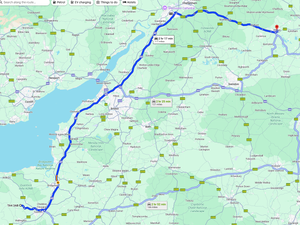-
Posts
8,352 -
Joined
-
Last visited
-
Days Won
70
Content Type
Profiles
Forums
Gallery
Downloads
Blogs
Events
Our Shop
Movies
Everything posted by Jerry_Atrick
-
Nope - preying on peoples' fears to divert attention from the real issues causing damage to their country.. and pi55ed off because the Chump family are down a few billion as the crypto markets have come off their peak
-
After today's ride. I may need the CBT you refer to! Here is the map of toiday's ride: Yep - that's how far away the CAA/CASA medical examiner is. We have a closer CAA examiner, but she works part time and is booked up months ahead. All up, 5 hours in the saddle - mainly motorway and dual lane carriageway A roads (like motorways) + single lane A roads. It was a grey day today, to boot! The ride there wasn't too bad,. This time I remembered by ear plugs - made a big difference. But my helmet isn't as comfortable as it was when I first tried it on. I am going to have to put it up for sale, swearing on mt first and second born's life it hasn't been dropped - which it hasn't been.. Of course, I would never trust anyone to be honest, so I am not sure why I would ask anyone to trust me, but there are plenty of helmets for sale of farcebook marketplace, so will see how it goes. But, apart from having a purpose for this ride, it gave me a lot of time to really assess the bike. And since the route took me within 200m of the location I purchased it from I don't need to go over old ground. On the motoraway, I stayed mainly at 70mph, except for where there were roadworks, or on the way home, queues south of Bristol thanks to peak hour traffic queuign to get off the motorway at various junctions. I did occasionally take it up to slightly past 80, but sat mainly at 70. The good bits: Oodles of power throughout the range of speeds/gear combos. 6th pulls at 40 miles and hour or beyond 80. Comfortable riding position, egronimically as one would expect (mainly). The Delkovic cans aren't too imposing, but have a reasonablye good warble/grumble sound. Bike is well weighted, handles well on the motorways and twisties and despite its weight/size is very easy to ride. It puts a smile on one's face The storm guards worked a treat - I did have to only intermittently put the heated grips on - and even then I would argue I was being way too soft. The bad bits: For touring, it revs too high for the touring speeds in my opinion. It makes it quite noisy. It could use another gear or one can purchase aftermarket sprokects with one tooth less than the standard, but that negatively impacts acceleration. It's thrirstier than I thought. People on forums qere quoting 200 - 225 miles on a 19 litre tank. I was lucky to get 180., Howeve, I checked the CBF1000 forums and did some research, and although the owners manual is OK with 95 RON, the forums are reporting best fuel efficiency with 98 or better RON. The side stand is piddly and hard to deploy while seated on the bike. The hydarulic hoses from the brake master cylinder block the fuel gauge - you have to always look over them. The oil level viewing glass is recessed too far and is a pain to check unless it is on its centre stand (not always practival due to cambered surfaces). The obvious stator issue - Should be good for a while, but one needs to check the oil is topped up! None too impressedd by the dipped and high beams... But, it could be because they are old globe. May get touring lights anyway. The "ain't perfect, but doesn't really matter bits: Buffeting is worse than I thought given the screen it has. Wake turbulence from trucks seemed to throw one around a liltte more than expected given the weight of the bike. I guess being slightly taller makes it more susceptible. The ride itself was, in the end quite tiring. The drizzle held off and the weather was relatively warm at about 9 degrees, until light started fading. Then the mercury dropped and a fine drizze appeared, thickening to almost a light shower at some places. Once it was dark, the oncoming headlight beams were refracting off the droplets on the visor making it hard to jiudge distances and see lane markings on the motorway in the dark. To top it off, the pervious pilot had run late, so I left later, which meant in peak hour, which on the motorway, is not a great experience. Can't put the cover on tonight as it was raining when I got home. Partner won't allow me to put it on the patio because of the brittle tiles which will cost us more than the bike to replace. So the bike is naked this evening. The dilapidated garage still has too much stuff in it.
-

Celebrating Positives (offset of the Gripes Thread)
Jerry_Atrick replied to Jerry_Atrick's topic in General Discussion
Aye, Apples secondhand are still expensive -
Day 7 of ownership.. (Sunday). Met Andy from the village on his Ducati. The rain gods were holding back so we decided to head off. Apparently, some bright engineer at Ducati decided for his model, that the wiring harness would be best positioned right behind the front wheel. What could possibly go wong? Hence, Andy only rides it on dry days. We departed the village and took a slight deviation from the map as he wanted to attak some twisties (not of the epicurean type). Am I am coming off a fairly long break, I was wondering if it was a good idea to get a bigger bike than I have ever had as I saw he and his bike's posterior diminish in my vision as he pulled away. I did catch up with him a few times, but I was takign things easy and getting to know the bike. I think that's what I will name "her" (can I use that metaphorical term in today's politically correct age?). Yep, something imaginative like "the bike" rings well with me. Anyway, as I looked down to check all things were OK, I realise I had forgotten that these things called motorbikes need this thing called fuel to go.. I had almost totally forgotten as I spied this white needle nudging the red area of the fuekl gauge to tell me it was hitting the reserves. Ship! We were a fair way from the nearest garage that was open and I had no idea how many litres or miles I had. I have read the owner's manual, but had a total blank of what I had left. As it turned out, we made it to Minehead without the needle moving much intot he red and bee-lined it to the Tescos (think Coles, but a little better), which had a "forecourt" (i.e. petrol station/garage). Why the English need to call teh same thing something different because of where it is located has escaped me to this day. Anyway, I digress. I realise, of the 19 litre tank, I can only put is almost 13 litres, so I feel the reserve is uite sufficient to get me home, but I am relieved that I have filled up the bike with much needed fuel. The ride home was slightly different. We went along the originally planned route, which has more cars (the other route had more bikes than cars. The rain started, so Andy was in a hurry to get home. But, as I followed him, my confidence grew and I was leaning into the turns better, trusting my rubbers (oi! front and rear tyres - not what you're thinking - although one has to trust those, too). Andy and his bike's posterior never reduced to a dot on the horizon as they did previously.. In fact, I had to will hom to overtake once.. I guess he was worried about those Ducati electrics. We arrive back at my place, and Andy and I had a chin wag for wa while, as the light rain had well and truly subsided. He was providing me good advice and we were already planning a) the next ride out, and b) maybe starting the Halse Angels (@Marty_d, you will be an honurary patron for coming up with the name in the first place). Day 8 (Monday), and I realise, ship, despite there not being terriblyy much riding, as some of it is down counry lanes, the bike dirty.. And I don't have a) cleaning kit, not b) chain/brake cleaning/degreasing (chain) and lube kit, But, the bike sits under covers all day. Day 9 and it is under covers all day. But I buy from a local shop the chain degreaser and lube, but they have no chain cleaning brushes. Day 10 (today), there is a 5th rider I know of from Halse who can join the Halse Angels. Son's CBT training is done. Day 11 (tomorrow): The weather, though slightly raining, is going to be warmish - 10 - 11 degrees. Plan is here to Oxford (Near RAF Benson) for a Class 2 CAA and CASA medical. And I am taking the bike! Notice, it is called the bike.. not the town bike, for a reason. Loves to be ridden, but only by one guy.
-
Dang.. tired everythign I know... Bloomberg must know I am a previous terminal user and refuses to allow me to read the article until I subscribe.
-
A long lost xth cousin of mine had a HQ panelvan (don't think it was a Sandman, but it was hotted up in the old vernacular). He hit a roo at speed (I am guessing c. 100kph), and the roo ended up in the car, hit him and he suffered mild brain damage as a result. I am not sure less aerodynamic cars makes that much of a difference - maybe at lower speeds (say 60kph) it does.
-

Celebrating Positives (offset of the Gripes Thread)
Jerry_Atrick replied to Jerry_Atrick's topic in General Discussion
I only buy second hand phones from dodgy phone shops around town. But, I find they work well. I have a Samsung A52 that was about two years old when I bought it and I have had it three years. Paid £100 for it, and it is fantastic. Doesn't miss a beat. I bought my son a 5g version of it for £140.. goes like the clappers. The camera though, is carp. @red750 - lower end Samsungs may not have the phone uality you want given your photographic skills. See if you can try one before you buy it.. My son ended up saving for himself and bought a one-13 or something - some Chinese "rubbish" Wasn't cheap, but for 1/2 the proice of whatever iphone was the latest when he bought it, and with better chips and camera, it was a steal. He gave me the A52 I bought for him, but I like my older one that is only 4g so much, have never bothered "upgrading". -
Yep.. that is where he succeeds where other pollies fail
-
The reality is Labor is politically failing big time and the conservatives have become such a basket case, they make the Libs look like rational people caring for the wider population. The Lib demo are for some reason unable to capitalise mainly because they look like a lefty version of Labour, I guess. Quite amazingly, the Greens are on course to poll better than Labour: https://www.theguardian.com/commentisfree/2025/nov/11/greens-overtake-labour-polls-zack-polanski There is some resentment over the failure of Brexit, but that is more attributed to the Conservatives handling of it and Labour failing to grasp the new opportunities Brexit apparently provides than Brexit itself.. And Farage has the gift of the gab and uses it far more skillfully than Chump.. and he is able to deflect blame successfully to immigration and when it goes pear shaped, not enough of the press hold him to account for some strange reason. Even the Reform councils that are sending their councils broke or being convicted of crimes seems to not make headlines. I think it is a case of them at least appearing to be listening to the little person..
-
Fixed average speed cameras seem to work pretty well here. Cheaper to install I would guess and can pay for themselves too
-
Sounds like an inappropriate use of Technology when speed bumps do the job adequately or at least no less inadequately
-
Not sure, but fujitice journo Shane Dowling is running with it. https://kangaroocourtofaustralia.com/2025/11/23/kevin-rudd-pays-lawyers-to-cover-up-his-jeffrey-epstein-link/
-
You're not claiming to be a mining scumbag, are you?
-
Wilfully blind, ignorant and gullible in one. You don't play cricket for England, do you? The "man" has presided over defunding government departments designed and, in US terms, making the US clean and healthy, such as the FDA, Obamacare, the FAA, and the like. Maybe you should go over there and experience first hand what it is like. Many of my US based friends are telling me to stay away as it is turning more and more to shit Oh, and pardoning criminals to go out and murder again is also a positive in your mind, I guess?
-
It already has
-
Mate, I am not waiting for it. I bought at this time of year as a commuter, and I am going to use it as such. I didn't get my ride in today, but that is OK as the Ducati boy has said his Ducati i a little sensitive to rain and cold, and tomorrow is rainy and cold. So, I will go out then and hit those twisties. I got some of my planned items done today... To cut a very long story short, didn't go to Gloucester, but ended up at a main dealer in Exeter that had 20% off everything. BThe sales assistant was young, female, and blonde. And I thought great, a Saturday student workder. Holey moley, she knew her stuff.. well beyond blokes with 20 years riding experience. She was absolutely professional, and the lad was totally enamoured by her, professionally (though I doubt he would say no to a quick drink with her, even though he doesn't drink). @facthunter - goes to show, blondes do have brains! She would give most of us a run for our brainiac money.
-
Yes, although she made for great comedy, I have to admit. Also, isn't it funny how people switch from being great supporter to great critic of Chump... (or vice versa in the case of Graeme Lindsay and the Texan congressman whose name I can't remember at the moment.
-
Agree.. Trust me, if it made the real news, my partner would know about it. I just checked and she hasn't heard anything about it, so as the bellwhether of all shlock news, I would also call it fake. BTW, if it were true, I would agree with the purported kings response!
-
I did tell my son to wait until he got to Aus to learn to ride. He is starting to complain that 125CC - especially around rural areas is simply not enough power should he need to get out of a pickly - or get to 70 (for most bikes) on dual carriageways. My son is not the cavalier sort by any stretcy of the imagination and the chances of him voluntarily exceeding a speed limit, even on a Hyabusa, is about the same as someone willing first division lottery every Saturday in a row, for a month. I looked up Vicroads learner bike restrictions, and wow, was I shocked, If anything, I would have expected the restrictions to have come down unilaterally to below 250c, but can be up to 660cc if thei have a power to weight ratio of up to 150kw/tonne (actially Transport Vic lists it and not Vicroads): https://transport.vic.gov.au/road-and-active-transport/road-rules-and-safety/motorcycles/motorcycles-for-learner-and-restricted-riders#h2-e4cr8 If a bike is not on the approved list on that web page and it meets reuirements, you can apply to have the bike you want added to the list. 150kw/tonne seems massive, given the kw/tonne of a Hyabusa is about 570... So unless they have some dicky formula rather than sijmple kw/weight * factor to get weight to a tonne, it would seem just about every bike under 660cc counts. My son's desired steed, a Triumph Speed 400, would certainly fit the bill. Anyway, back to the blog: Day 5 (yesterday) of ownership saw it stand under the covers. It was a lovely sunny day and got to 9 degrees, but with this reno and needing to get stuff done, didn't get the time. I had whatsapped two of the local village riders to let them know I had a bike, but one didn't believe me. My partner and I decided to eat the the village pub last night (foor was unusually very good - I was on orange juice and sodas as the beers there aren't great and I didn't want to have wine on account of severly reducing alcohol intake). We took the dog, but he was playing up so after dinner, I took the mut home and partner stayed on. One of the riders I text arrived after I left, and my partner told me when she got home he thought I was pulling his leg. So, tomorrow - Day 7, have a small ride out planned with he who was a disbeliever. This is the route: For context, within England a slightly wider map: Day 6 (today): It started wet today and the cover did a good job of keeping the rain off. In front of the dilapidated garage is a build up of soil thanks to a blocked drain thanks to builders digging up some of the lawn dlose to the long driveway and rain washing the soil down to the drain. So, the plan today is: Gotta help prepare the cottage for this weekend's holiday let. Taking the lad to Glocester (about an hour and a half away) to get Helmet and boots (nothing much in Tauton nor Exeter; the mega store in Bristol doesn't have great deals on helmets at the moment. Back and clear the soils from the front of the garage and unblock the drain. Maybe take the bike out in the wet for a small confidence builder. Bike to be put in garage. Here is the bike today in the muck of weather we have today: A bit different to Marty's post on Celebrating Positives 😞
-
And it's a terrible/trajic joke of history both were put and kept democratically (and it looks like one will go as undemocratic as the other).
-

Celebrating Positives (offset of the Gripes Thread)
Jerry_Atrick replied to Jerry_Atrick's topic in General Discussion
Looks like a lovely day for it! Sorry about my poost afterwards. For some reason your post didn't come up, nor was there a notification of replies to the thread. -

Celebrating Positives (offset of the Gripes Thread)
Jerry_Atrick replied to Jerry_Atrick's topic in General Discussion
Maybe a new thread? The NHS here is free at point of use. Goin to a GP costs nothing at the time. When I first came to the UK in 1996/97, I was amazed at how good it was and considering the public/private system in Australia, one was waiting longer at Aussie public hospitals, etc. But the NHS as a service has deterioriated sigfnificantly since then.. there were waits in A&E/Casualty/ER literally for days - I think 99 hours was reported at one stage! It wasn't the "Slow down, mate" attitude. The front line staff are generally (admittedly not always) conscientious and while they aren't running at break-neck speeds for 12 and beyind hours, they put in a decent amount of work. In addition, They are always on call, etc. One of the good things under TTony Blair was it was well fundedm a politics was as removed from the service as possible. You could get a GP appointment almost anyhere in the country same day, Even if you were privately insured (not very common at the time), you would go public for anything not elective. Private insurance was (and still is) very expensive. The problem is when the converatives came in, they played political football with it. Reform after reform, introducing more and more layers of management and administration, splitting them into trusts with an eye to prrivatising the system took more and more of the budget away from front line services and more and more in to management and admin. In addition, hell bent on ideology, they privatised services - some critical, which meant more of the budget to investors and more admin and even less of the budget to actual front line services., Of course, in private enterprise you tend to "innovate", which means in these sorts of situations, finding ways to extract more profit from a flat revenue.. and that rately results from captial investment. Of course, having a private/publoc model like Australia doesn't mean any of the above won't happen, either. The Howard reforms seems to have worked more for the insurance companies than the patient. I can recall before I left Australia, medical insruance was paid to Medibank Private, HBA, or a handful of others.. But the cover was almost limitless for what compared to today seems to be a very small premium. I have been researching medical insurance and it is now very expensive (of course, I was O/S when he introduced the changes, so I will have to pay the full loading when I return), and there are caps that mean once you really need the insurance you are pretty well SOL (ship outa luck). I am not against the loading per se, as it represents increased risk with age without previous contributions, but on my return to Aus, I may perpetually travel around (grey nomad???/) and use travel insurance - a lot cheaper. -
For the CBT here, it is an 8am start - 2 hours in the classroom covreing the road laws, bike basics, riding basics, and safety. Then it is as long as you need on site until the instructor and student are both comfortable on the bike and confident that the road will be OK. Then a minimum of two hours on the road. There is no pass or fail per se. You either get the certificate or you don't. If you don't, it is not recorded as a fail. You keep going as and when until you do (or give up trying). Here is a not very well organised syllabus from the guvmint: https://www.gov.uk/search/all?keywords=element+&manual[]=%2Fguidance%2Fcompulsory-basic-training-cbt-syllabus-and-guidance-notes













